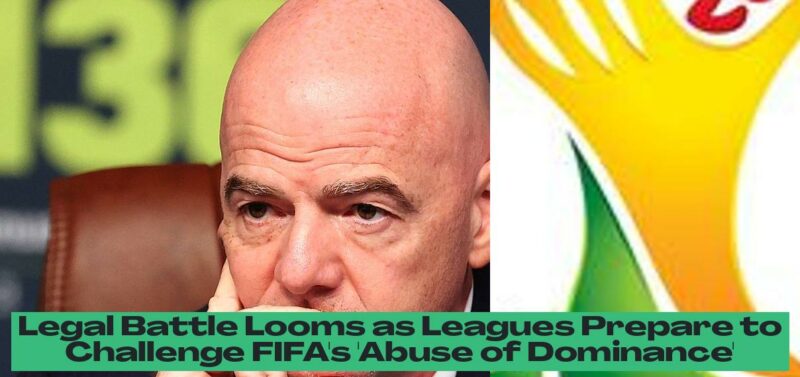Leagues to sue Fifa over ‘abuse of dominance’
The world of football is on the verge of a major legal battle. The top European leagues, including the powerful Premier League, and the global players’ union Fifpro are gearing up to take legal action against FIFA, the sport’s governing body. They accuse FIFA of “abuse of dominance” in the game, a claim that threatens to shake the very foundations of football governance.
The European Leagues, representing 39 leagues and over 1,130 clubs across 33 countries, are leading the charge. They’ve filed a complaint with the European Commission, hoping to protect the well-being of players. This legal action is a direct response to the growing pressure from leagues and player unions, who are increasingly concerned about the relentless expansion of the football calendar and its detrimental impact on players.
Fifpro, the global players’ union, has echoed these concerns. They describe the current international calendar as “beyond saturation,” “unsustainable for national leagues,” and a “risk for the health of players.” They argue that FIFA’s decisions have consistently prioritized its own competitions and commercial interests, neglecting its duty as a governing body and harming the financial interests of national leagues and the well-being of players.
The situation has reached a boiling point, with legal action being seen as the only viable path forward for European leagues and player unions. They aim to protect the sport, its ecosystem, and the players who make it all possible. FIFA’s decision-making process has been criticized for a lack of transparency and inclusivity, particularly when it comes to involving national leagues and player unions. Despite repeated calls for a clear and transparent process regarding the international match calendar, FIFA has remained unresponsive.
The action is not limited to the European Leagues. La Liga, although not a member of the group, is also joining the legal challenge. The English Football League, Scottish Professional Football League, Serie A, and the Bundesliga are among the prominent leagues joining forces in this fight for change.
- The top European leagues, including the Premier League, and global players’ union Fifpro are suing FIFA for “abuse of dominance” in football governance.
- European Leagues and Fifpro are concerned about the relentless expansion of the football calendar impacting player well-being and national leagues’ financial interests.
- FIFA’s decision-making process has been criticized for lack of transparency and inclusivity, leading to legal action as the only viable path forward for European leagues and player unions.
- Prominent leagues like La Liga, English Football League, Serie A, and Bundesliga are joining forces in the legal challenge against FIFA’s prioritization of its own competitions over the well-being of players and national leagues.
FIFA’s Response: Hypocrisy and Self-Interest
FIFA has responded to the legal action with a forceful defense, accusing some leagues of hypocrisy. They point to the fact that these same leagues send their players on extensive global pre-season tours, seemingly contradicting their concerns about the packed calendar. FIFA maintains that the current calendar was unanimously approved by the FIFA Council, which includes representatives from all continents, including Europe, following a comprehensive and inclusive consultation process that involved Fifpro and league bodies.
FIFA insists that its calendar is essential for the survival, co-existence, and prosperity of international football alongside domestic and continental club football. They argue that some European leagues are acting out of commercial self-interest and hypocrisy, neglecting the broader interests of global football. These leagues, according to FIFA, prefer a calendar filled with friendlies and summer tours, often involving extensive travel, instead of focusing on the overall health of the sport.
FIFA emphasizes its commitment to protecting the interests of world football, including the well-being of players worldwide at all levels of the game. They see the legal action as a threat to this commitment, as it prioritizes the interests of a select few leagues over the broader needs of the sport.
The CIES Football Observatory Weighs In
A recent study by the CIES Football Observatory, a research group at the International Centre for Sports Studies, sheds light on the issue of schedules and player workload. Their findings suggest that clubs are not necessarily playing more matches per season overall.
The report revealed that between 2012 and 2024, the average number of fixtures per club and season remained just over 40. While around 5% of clubs played 60 or more games per season, there was no significant change in the proportion of clubs reaching this high number of matches.
The CIES report, while not directly addressing FIFA’s dominance, provides a valuable context to the debate surrounding the intensity of the football calendar. It highlights that the focus should not solely be on the overall number of matches, but also on the distribution and scheduling of these matches, which can significantly impact player workload and well-being.
The PFA’s Stand: Players at Breaking Point
Maheta Molango, the Chief Executive of the PFA and Fifpro board member, has spoken out strongly about the situation. He warned in May that players are reaching a breaking point and could resort to strikes if they continue to be overworked.
The expansion of the Club World Cup, scheduled to be held in the USA between June and July 2025, has further strained the calendar. The African Cup of Nations, which was originally scheduled for the summer, has been moved to December 2025 and January 2026 as a result. This move is likely to have a significant impact on the Champions League knockout stages during that season.
Molango emphasizes that legal action is a last resort, a necessary consequence of major stakeholders being ignored. He argues that the current approach to the fixture calendar is unsustainable and that players are being asked to bear the brunt of the burden. He believes that the situation has reached a point where drastic change is required to prevent players from being pushed beyond their limits.
Analysis: A United Front for Change
This legal action represents a significant moment in football governance. It signals a united front between leagues and unions, a powerful force that aims to bring about change in FIFA’s decision-making process.
The threat of legal action has been brewing for over a year. Now, with the leagues and unions joining forces, the stakes have been raised considerably. This united front demonstrates the shared frustration over the lack of attention paid to the concerns of players and leagues. The PFA, known for advocating for the rights of its members, has been instrumental in forging this alliance, ensuring that players are at the heart of this fight.
FIFA’s response, while strong in its defense, highlights the complex dynamics at play. The accusations of hypocrisy and self-interest directed at the leagues, while potentially valid, also underscore the underlying tension between the governing body and those who operate within the sport. The legal battle promises to be a long and arduous one, with both sides prepared to fight for their respective positions.
The outcome of this legal action will have far-reaching implications for the future of football. It will determine the balance of power within the sport, the role of FIFA, and the future of the international calendar. The fight for change is underway, and the world of football is watching with bated breath.









